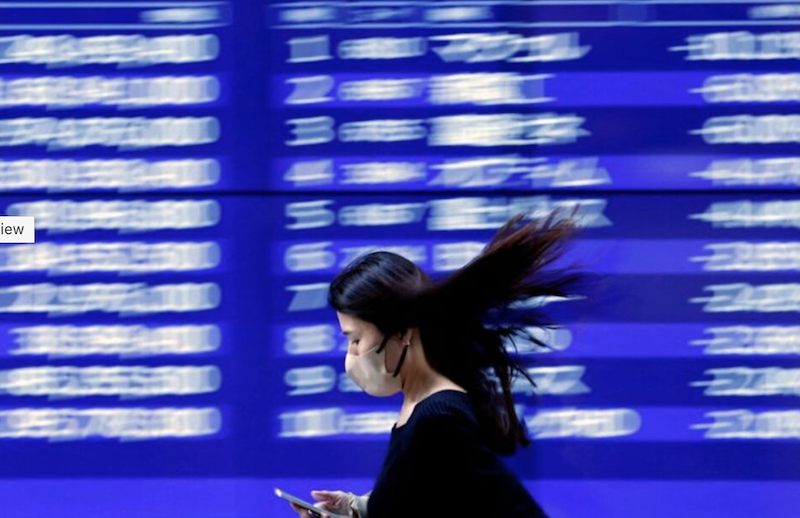Asian stocks were mixed on Thursday in the absence of any strong cues for investors, as a Wall Street rally faded and the waiting game on US interest rates continued.
The equities rally, which had been driven by the Federal Reserve’s dovish turn, stalled overnight even after US economic data that beat expectations initially turned the major indexes green. A far steeper-than-expected decline in British inflation also took markets by surprise.
That fed into the mood in Asia where Japan’s Nikkei share average dropped following the sharp Wall Street sell-off, slipping from near historical highs, while automaker Toyota’s shares tumbled 4% on a widening safety inspection scandal at its unit Daihatsu Motor.
Also on AF: Chinese Car Exports to EU Seen Hit by Red Sea Ship Attacks
The Nikkei lost 1.59% to close at 33,140.47. Of its 225 components, 187 declined, 36 rose and two were flat. The broader Topix declined 1.00%.
On Wednesday, the Nikkei had reached 33,824.06, approaching last month’s 33-year peak, after the Bank of Japan stuck to a dovish posture a day earlier, disappointing traders who had expected hints of a near-term exit from stimulus.
Japanese equities had also been riding the rally in US stocks that took the Dow and Nasdaq to record highs this week, amid expectations that the Federal Reserve is close to cutting interest rates and the economy is set for a soft landing.
China stocks rose, however, rebounded from a near five-year low hit in the previous session, while Hong Kong shares were largely flat, weighed by weaker global markets.
In mainland China markets, shares in new energy, artificial intelligence and tourism companies jumped by between 1.5% and 2.7% to lead the gains.
The blue-chip CSI 300 Index rose 1.01% but hovered around its lowest level since February 2019. The Shanghai Composite Index rose 0.57%, or 16.61 points, to 2,918.71, while the Shenzhen Composite Index on China’s second exchange was ahead 0.90%, or 16.16 points, to 1,801.50.
In Hong Kong, tech giants slipped 0.4%. However, Alibaba and Meituan both rose 1.1%. The Hang Seng Index edged up 0.04%, or 7.32 points, to 16,621.13.
Elsewhere across the region, in earlier trade, Sydney, Seoul, Taipei, Jakarta and Manila were in the red. Singapore, Mumbai and Wellington eked out small gains.
MSCI’s broadest index of Asia-Pacific shares outside Japan was down 0.3%, though the index is up 1.7% so far this month.
UK Inflation Surprise
European markets were set for a lower open, with the pan-region Euro Stoxx 50 futures down 0.48%, German DAX futures dipping 0.44% and FTSE futures falling 0.57%. US stock futures, the S&P 500 e-minis, were up 0.33%.
All three major US stock indexes, which were at or near record highs this week, veered lower late on Wednesday to end 1.3% to 1.5% below Tuesday’s close.
In US Treasuries, the yield on benchmark 10-year Treasury notes reached 3.8676% compared with its US close of 3.877% on Wednesday when it fell to an almost five-month month low as government bond yields fell globally after the British inflation data.
The two-year yield, which rises with traders’ expectations of higher Fed fund rates, touched 4.3705% compared with a US close of 4.369%.
In currencies, the dollar index, which tracks the greenback against a basket of currencies of other major trading partners, was down at 102.29. The greenback on Wednesday strengthened against sterling after the British inflation data fuelled speculation of rate cuts by the Bank of England.
Sterling was last trading at $1.2646, up 0.06% on the day, while the euro was up 0.1% at $1.095.
In commodities, global oil benchmark Brent hovered above $80 a barrel amid jitters over global trade disruptions and geopolitical tensions in the Middle East following attacks on ships in the Red Sea by Yemen’s Iran-aligned Houthi forces.
Brent crude was last trading at $79.62 per barrel and US crude dipped 0.11% to $74.14 a barrel.
Gold was slightly higher. Spot gold was traded at $2036.19 per ounce.
Key figures
Tokyo – Nikkei 225 < DOWN 1.59% at 33,140.47 (close)
Hong Kong – Hang Seng Index > UP 0.04% at 16,621.13 (close)
Shanghai – Composite > UP 0.57% at 2,918.71 (close)
London – FTSE 100 < DOWN 0.15% at 7,704.27 (0936 GMT)
New York – Dow < DOWN 1.27% at 37,082.00 (Wednesday close)
- Reuters with additional editing by Sean O’Meara
Read more:
China Holds Firm on Rates But Deflation Worries Weigh
‘Cheaper The Better’ Calls Harden China Deflation Battle
Japan to Power Up World Chip Sector Dominance Bid
Nikkei Boosted by Steadfast BoJ, Tech Drives Hang Seng Up
























